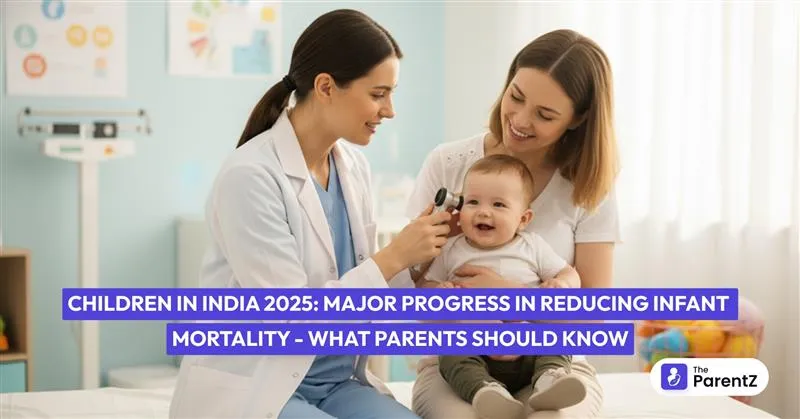There’s some good news for parents in India. Amid headlines about pollution and rising illnesses, one area where India has made truly great progress is infant survival. Simply put, more babies are now living past their first year than ever before.
Infant mortality, the death of a child before their first birthday, has dropped sharply over the last few decades. In 1981, 110 out of every 1,000 babies did not survive their first year. In 2023, that number fell to 25. It’s one of the most important measures of how a country is doing in terms of health and care for its people.
Why This News Matters for Parents
You might wonder why “infant mortality” sounds like something only doctors should worry about. But the truth is, it reflects a lot more; it tells us how healthy mothers are during pregnancy, how safe our hospitals are during childbirth, and how strong our postnatal care systems have become.
For parents, this progress means two big things:
- Access to better care: It’s now easier and safer to deliver babies in hospitals or healthcare centers than ever before.
- Higher chances of survival: With improved medical support and early detection, even babies born early (preterm) have a better chance of growing up healthy.
Yet, the first few weeks after birth remain critical. More than two-thirds of infant deaths happen in the first month, mostly due to complications like preterm births, infections, or lack of proper neonatal care. So even with progress, awareness and timely care remain key.
What Helped India Improve
A lot has changed in India’s healthcare system. From rural clinics to digital health missions, several steps have directly helped reduce infant deaths:
- Institutional deliveries: More mothers now give birth in hospitals instead of at home. In many states, over 80% of births happen under medical supervision.
- Government programs: Initiatives like the National Health Mission (NHM), Janani Suraksha Yojana, and Ayushman Bharat have made a big difference in maternal and child health.
- Better pre and postnatal care: More women now receive antenatal checkups, vaccinations, and nutritional guidance.
- Awareness and education: There’s greater understanding now about the importance of breastfeeding, hygiene, and vaccinations in keeping newborns safe.
A great example comes from Uttarakhand, where the Infant Mortality Rate has fallen from 52 to just 20 over the past 25 years; a 60% drop. With more government hospitals, mother-and-child care centers, and outreach programs, even remote hill areas are now seeing healthier babies and mothers.
The Gaps That Still Need Attention
While India’s average improvement is impressive, not all regions are progressing at the same pace.
- Southern states like Kerala and Tamil Nadu lead the way, with IMRs of 5 and 12, respectively, matching developed countries.
- Northern states such as Uttar Pradesh, Bihar, and Madhya Pradesh still have higher rates, around 37 deaths per 1,000 births.
- Within cities, richer families have much better access to care than poorer ones, where infant deaths can be up to three times higher.
The goal now is to close these gaps. India’s Sustainable Development Goal (SDG) target is to bring neonatal deaths down to 12 per 1,000 live births by 2030, and that means focusing more on the newborn phase and on poorer communities.
What Parents Should Take Away from This
As a parent or soon-to-be parent, this improvement means your baby’s chances of survival and good health are stronger today than they were a decade ago. But it’s still important to take every preventive step seriously.
Here’s how you can use this information in daily life:
- Choose institutional delivery whenever possible: Hospitals or accredited health centers have trained staff and emergency care if needed.
- Go for all four antenatal visits: Follow the doctor’s advice throughout pregnancy, as it helps detect risks early.
- Get vaccination schedules right: Timely vaccination in the first year protects against infections that once caused many infant deaths.
- Practice clean home care: Simple hygiene practices like handwashing, clean feeding utensils, and safe drinking water can save lives.
- Breastfeed exclusively for 6 months: Mother’s milk boosts immunity and reduces the risk of diarrhoea or respiratory illness.
- Keep an eye on signs of trouble: If the baby is feeding poorly, breathing fast, or seems unusually dull, don’t delay medical attention.
Every small step counts when it comes to protecting newborns. And while government programs have helped lower infant deaths, parents’ awareness and action remain the strongest defense.
Conclusion
The story of India’s declining infant mortality rate is one of progress, teamwork, and hope. From doctors in busy hospitals to workers in rural health centers, and from informed mothers to vigilant fathers, everyone has played a role.
Yes, challenges still exist, especially in rural and poorer areas, but the overall direction is positive. Fewer children are dying in their first year, and more are living to see school, play, and thrive.
For today’s parents, that’s the best encouragement there can be: knowing that the next generation is healthier, stronger, and safer than before.





Be the first one to comment on this story.